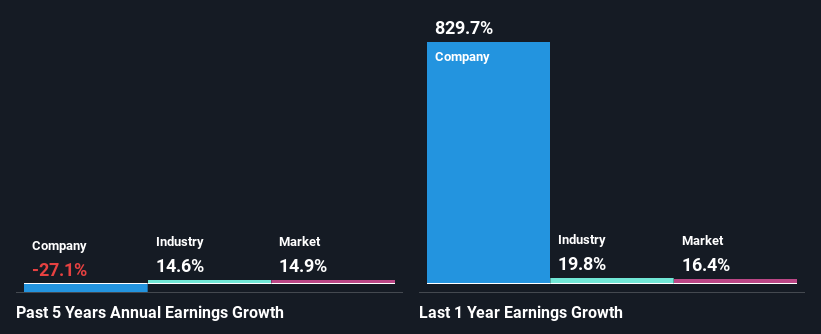- United States
- /
- Diversified Financial
- /
- NYSE:FIS
Is Fidelity National Information Services, Inc.'s (NYSE:FIS) Stock On A Downtrend As A Result Of Its Poor Financials?

With its stock down 4.7% over the past week, it is easy to disregard Fidelity National Information Services (NYSE:FIS). To decide if this trend could continue, we decided to look at its weak fundamentals as they shape the long-term market trends. Particularly, we will be paying attention to Fidelity National Information Services' ROE today.
Return on equity or ROE is an important factor to be considered by a shareholder because it tells them how effectively their capital is being reinvested. Simply put, it is used to assess the profitability of a company in relation to its equity capital.
See our latest analysis for Fidelity National Information Services
How To Calculate Return On Equity?
Return on equity can be calculated by using the formula:
Return on Equity = Net Profit (from continuing operations) ÷ Shareholders' Equity
So, based on the above formula, the ROE for Fidelity National Information Services is:
1.8% = US$853m ÷ US$47b (Based on the trailing twelve months to June 2022).
The 'return' is the yearly profit. That means that for every $1 worth of shareholders' equity, the company generated $0.02 in profit.
What Has ROE Got To Do With Earnings Growth?
We have already established that ROE serves as an efficient profit-generating gauge for a company's future earnings. Depending on how much of these profits the company reinvests or "retains", and how effectively it does so, we are then able to assess a company’s earnings growth potential. Generally speaking, other things being equal, firms with a high return on equity and profit retention, have a higher growth rate than firms that don’t share these attributes.
Fidelity National Information Services' Earnings Growth And 1.8% ROE
As you can see, Fidelity National Information Services' ROE looks pretty weak. Even when compared to the industry average of 15%, the ROE figure is pretty disappointing. Given the circumstances, the significant decline in net income by 27% seen by Fidelity National Information Services over the last five years is not surprising. We reckon that there could also be other factors at play here. For example, the business has allocated capital poorly, or that the company has a very high payout ratio.
That being said, we compared Fidelity National Information Services' performance with the industry and were concerned when we found that while the company has shrunk its earnings, the industry has grown its earnings at a rate of 15% in the same period.

Earnings growth is a huge factor in stock valuation. What investors need to determine next is if the expected earnings growth, or the lack of it, is already built into the share price. By doing so, they will have an idea if the stock is headed into clear blue waters or if swampy waters await. What is FIS worth today? The intrinsic value infographic in our free research report helps visualize whether FIS is currently mispriced by the market.
Is Fidelity National Information Services Making Efficient Use Of Its Profits?
Fidelity National Information Services' high three-year median payout ratio of 209% suggests that the company is depleting its resources to keep up its dividend payments, and this shows in its shrinking earnings. Paying a dividend beyond their means is usually not viable over the long term.
Additionally, Fidelity National Information Services has paid dividends over a period of at least ten years, which means that the company's management is determined to pay dividends even if it means little to no earnings growth. Upon studying the latest analysts' consensus data, we found that the company's future payout ratio is expected to drop to 24% over the next three years. As a result, the expected drop in Fidelity National Information Services' payout ratio explains the anticipated rise in the company's future ROE to 11%, over the same period.
Conclusion
Overall, we would be extremely cautious before making any decision on Fidelity National Information Services. The low ROE, combined with the fact that the company is paying out almost if not all, of its profits as dividends, has resulted in the lack or absence of growth in its earnings. That being so, the latest industry analyst forecasts show that the analysts are expecting to see a huge improvement in the company's earnings growth rate. Are these analysts expectations based on the broad expectations for the industry, or on the company's fundamentals? Click here to be taken to our analyst's forecasts page for the company.
New: AI Stock Screener & Alerts
Our new AI Stock Screener scans the market every day to uncover opportunities.
• Dividend Powerhouses (3%+ Yield)
• Undervalued Small Caps with Insider Buying
• High growth Tech and AI Companies
Or build your own from over 50 metrics.
Have feedback on this article? Concerned about the content? Get in touch with us directly. Alternatively, email editorial-team (at) simplywallst.com.
This article by Simply Wall St is general in nature. We provide commentary based on historical data and analyst forecasts only using an unbiased methodology and our articles are not intended to be financial advice. It does not constitute a recommendation to buy or sell any stock, and does not take account of your objectives, or your financial situation. We aim to bring you long-term focused analysis driven by fundamental data. Note that our analysis may not factor in the latest price-sensitive company announcements or qualitative material. Simply Wall St has no position in any stocks mentioned.
About NYSE:FIS
Fidelity National Information Services
Fidelity National Information Services, Inc.
Solid track record with reasonable growth potential.
Similar Companies
Market Insights
Community Narratives




